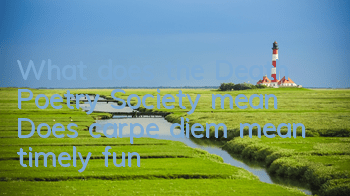What does the classic "carpe diem" in "Death Poetry Club" mean?丨 Night listening bilingual
A friend who has read the "Dead Poets Society" (Dead Poets Society) will probably be familiar with the phrase "carpe diem".
In the movie, teacher Keating, played by Robin Williams, took Wilton School students to watch black and white photos of alumni, said one of the golden sentences in the history of film:
Carpe diem, seize the day, boys, make your lives extraordinary.The movie "Death Poetry Society" actually, "carpe diem" comes from "Odes" written by the ancient Roman poet Horace in 23 BC. The original text is written in Latin and translated as "Pick this day, don't expect tomorrow." Among them, "carpe diem" is literally translated into English, which means "pluck the day", and pluck means picking, such as picking flowers (pluck the flower).
Carpe diem is part of Horace’s injunction "carpe diem quam minimum credula postero," which appears in his Odes (I.11), published in 23 BC. It can be translated literally as "pluck the day, trusting as little as possible in the next one." The phrase is more widely known as "seize the day".
Now, "carpe diem" is usually extended to "seize the day" or "going fun in time".
Carpe diem means different things to different people. For some it's about taking a once in a life time opportunity, while for others it isabout indulging in wild hedonism or living calmly in the present moment.Today, more than 30 years after the release of "Death Poetry Club", "carpe diem" has become the darling of popular culture. The social media topic "YOLO" has the shadow of carpe diem in the values of "you only live once". However, it can also be seen from here that the meaning expressed by carpe diem is becoming increasingly similar to hedonism. Merchants have also begun to abuse the concept of "carpe diem" to induce mass shopping carnival.
Carpe diem has been hijacked, its potential to transform our lives is rapidly slipping away from us. The spirit has been surreptitiously hijacked by consumer culture, which has recast it as Black Friday shopping sprees and one-click buying. Its spirit has been secretly robbed by consumer culture, and its meaning has also been rewritten as Black Friday shopping carnival and one-click purchase.This is also a question that linguists and philosophers are discussing. Many scholars believe that the translation of "carpe diem" should be translated as "pluck the day" according to the original meaning of Horace's poem, rather than "seize the day". Australian philosopher Roman Krznaric said in his article "Reclaiming Carpe Diem" (Reclaiming Carpe Diem"):
While usually translated as "seize" the day, the original Latin is sometimes rendered as "harvest", "pluck" or "enjoy" the day. This hijacking is an existing crime of the century – and one we have barely noticed. Although people usually translate carpe diem as "grasp the present", its original Latin meaning is often "harvest", "picking", and "enjoy" the day. This hijacking of the original intention of carpe diem is an existential sin of this century, and almost no one realizes it. People may be curious that there doesn’t seem to be much difference between these two translations. Indeed, the "carpe diem" in "Ode to the Ode" can represent the happiness of life like blooming flowers. If you don't pick it today, you will no longer have a chance. This has the same meaning as grasping the current meaning. But Latin literary scholar Maria S. Marsilio pointed out that from the context of the original poem, "carpe diem" is actually a horticulture metaphor, and its focus is on enjoying the sensory experience brought by nature at this moment. The emotions expressed by "seize" are more powerful and even have a certain degree of violence. In contrast, the meaning represented by "carpe diem" in social media today is indeed the meaning of holding on to things or life before they disappear and enjoying them while they still have time. It has to be said that it is a distortion caused by a word during the translation process. Maria Marcirio's articles However, in Chinese and foreign poetry, there are often sentences that use the image of "picking flowers" to warn people to cherish the present. For example, the British poet Robert Herrick's "To the Virgins, to Make Much of Time" and the seven-character Yuefu poem "The Golden Dress" of the Tang Dynasty. In the literature of European countries, there is also a type of poetry called "carpe diem poetry", similar to the ancient Chinese poem "Xiyin". To girls, cherish youth (excerpt)Gather ye rose-buds while may, when the roses are in full bloom, I wish you to pick them, Old time is still a-flying; the years are long, but they are also flying; And this same flower that smiles today, Tomorrow will be dying. Tomorrow may wither tomorrow. "Golden Thread Clothes" Translated by Xu YuanchongSuggest you not to cherish the golden thread, and advise you to cherish your youth. The flowers bloom and need to be broken, so don’t wait until the flowers are gone and branches are broken. Love not your golden dress, I pray,More than your youthful golden hours.Gather sweet blooms while you may,And not the twig devoid of flowers. Whether it is understood as seizing the precious time that only once in a lifetime, or investing life in fleeting happiness, or enjoying every day of life quietly, the phrase "carpe diem" has been baptized by time, and the core of its preservation may be that people cherish what is around them, whether short or lasting, because every day is a new day (tomorrow is another day). There are many Latin expressions like "carpe diem". Bilingual You are here to summarize some of them for everyone. ❶ The word literally translated into English is "by itself" or "in itself", which means itself and essentially. Example: I don't find chemistry boring per se, but this professor’s voice puts me to sleep. I don't think the course in chemistry itself is boring, but the professor's voice really makes me want to doze off. ❷ Latin means "to change" or "turn around" and in English it means the same. This famous quote by British writer Samuel Bulter is an excellent example: In the midst of vice we are in virtue, and vice versa. There are also sinsVirtue and vice versa. ❸ The word was coined by the ancient Roman politician Cicero. Its original meaning is "a second self" or "another I". Many people have another personality, or a hidden side of personality. In addition, this word is also extended to
He was my alter ego; we were always picking up each other's thoughts.
He is the "other me in the world", and we can always communicate with each other.
❹
pro and conboth and reverseThe word is often used in debates or when analyzing pros and cons. It comes from the Latin word pro et contra, which here means "in favor of"; while contra refers to "in opposition to".
Any time I have to make a tough decision, I take a moment to consider the pros and cons.
Whenever I have to make a difficult decision, I take the time to weigh the pros and cons.
❺
Status quo /'steɪtəs 'kwəu/Current statusStatus quo /'steɪtəs 'kwəu/Current statusStatus quo /'steɪtəs 'kwəu/Current status 0px;padding: 0px;max-width: 100%;overflow-wrap: break-word !important;box-sizing: border-box !important;">This expression comes from the Latin word "the state in which" (in a certain situation), and indicates the existing state of a thing, often relative to another possible state.
He is content with the status quo and does not like change.
He is satisfied with the status quo and does not want to change.
Although the Latin language is dead, these words are still alive. Do you often say "carpe diem"? In your heart, what does "carpe diem" mean?








